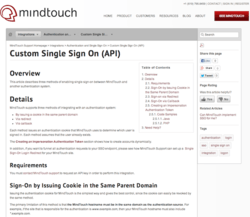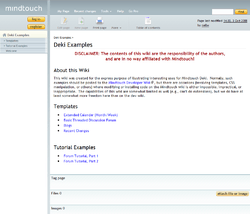MindTouch
 | |
|
MindTouch 4 default out of box experience | |
| Developer(s) | MindTouch, Inc. |
|---|---|
| Initial release | March 2013 |
| Development status | Active |
| Type | saas, cms, crm |
| License | Proprietary |
| Website |
www |
MindTouch is a commercial, cloud-delivered web platform for knowledge collaboration and multi-channel delivery of customer support documentation. It is produced by MindTouch, Inc., an American company based in San Diego, California.
MindTouch 4
MindTouch 4 is the current major version of the software service. MindTouch 4 powers customer support websites that provide customers with content, such as articles and videos, to learn more about an enterprise's products and resolve issues they may be having with them. The software also attempts to dissuade customers from filing support tickets by guiding customers to the most relevant content on the site.[1] MindTouch is considered a "multi-channel" platform,[2] since content can not only be consumed on MindTouch powered websites, but also in other sites and services via a RESTful API and embedded contextual help system.[3]
CRM integration
Integration partnerships with CRM vendors such as SAP[4][5] and Salesforce.com[6][7] provide support agents the ability to use MindTouch content in their customer support workflows.
Release cycle
MindTouch's cloud infrastructure delivers a new release of MindTouch 4 bug fixes and features every week with no visible downtime to site visitors.[8]
MindTouch Core
 | |
|
MindTouch Core using the Fiesta theme. | |
| Developer(s) | MindTouch, Inc. and community contributors |
|---|---|
| Initial release | July 2006[9] |
| Stable release | 10.1.4 / January 22, 2013 |
| Written in | PHP, C# |
| Operating system | Any (.NET/Mono required) |
| Available in | many languages |
| Type | wiki |
| License | GPL |
| Website |
www |
Formerly known as MindTouch Deki and MindTouch DekiWiki, MindTouch Core was an open-source enterprise web-based wiki software and mashup platform. On April 9, 2013 Mindtouch Inc. announced[9] that they no longer supported their open source offering MindTouch Core. The last open-source releases of MindTouch Core are still available on SourceForge.
MindTouch Core consists of back-end and several front-ends providing different functionality. The back-end is written in C# and can be deployed on the Mono platform, or on the .NET framework. The web front-end interacts with the back-end via a REST API. Each wiki page is automatically exposed as an XML Web Service, which can be operated on using standard HTTP verbs.[10]
Wiki front-end
The main functionality of MindTouch Core is accessed with a PHP frontend, which provides a wiki with a WYSIWYG editor.[11]
All information in MindTouch Core pages is stored as XML, rather than wikitext. Pages are edited using a GUI editor, and can be manipulated as an XML web service. The frontend supports embedding rich media and has a built-in image gallery.[11]
The software supports authentication with Apache or IIS modules.[12] Permissions can be applied to individual pages or page hierarchies.[11]
Other front-ends
Other front-ends (connectors) to the API allow users to export parts of their workflow to the wiki. The Desktop connector allows drag and drop export of the users' files; Microsoft Outlook connector allows publishing of messages, attachements or entire mail threads from Microsoft Outlook.[13][14]
An open-source iPhone interface named DekiMobile was released in November 2008.[15]
Mashups
MindTouch Core can make use of multiple connectors to perform mashups. MindTouch Core ships with extensions allowing connection to numerous online services,[16] including systems such as Google Maps, Windows Live, Flickr and Yahoo.[13] A now unsupported commercial license enabled features such as connectors to SugarCRM, Salesforce, LinkedIn, MySQL, Microsoft SQL Server and Microsoft Access.[16]
Multi-language
Multi-language support (named polyglot) allows switching interface and content languages on per page, per section and per user basis. In multilingual wikis the engine prioritizes search results by the user’s default language. MindTouch cite the 8.05 release of Deki as the first polyglot application on the web.[17][18]
Availability
The open source version MindTouch Core is distributed by SourceForge under the terms of the GNU General Public License (with some parts under GNU Lesser General Public License and Apache License).
DekiScript
Both MindTouch 4 and MindTouch Core include a complete scripting language, called DekiScript. DekiScript, a light-weight, interpreted programming language, allows users to add dynamic content to MindTouch pages. Both MindTouch 4 and MindTouch Core allow it to be embedded directly into web pages. MindTouch Core allows it to be extended through the use of XML extensions.[19]
Examples
Examples of MindTouch customer success sites include Remington Arms, Verizon, Blackboard, Wind River, PayPal, SuccessFactors, HP, and Intuit.[20]
Development history
MindTouch was forked from MediaWiki in 2005; the first release (under the name DekiWiki) occurred in July 2006, featuring XHTML in place of wikitext, a WYSIWYG editor and Lucene-based search.[21] Consequently the backend was completely reimplemented in C#, resulting in an API built as web services on top of the new DReAM ("Distributed REST Application Manager") server and toolset.[10]
MindTouch 4 was forked, internally within MindTouch, Inc., from the open-source MindTouch Core source code base in early 2010. In addition to some legacy PHP and C# components of MindTouch Core, MindTouch 4's software and infrastructure includes technologies such as NodeJS, Apache Cassandra, Elasticsearch, F#, Amazon SQS, HAProxy, and Puppet.
References
- ↑ Nusca, Andrew (2013-03-28), "MindTouch taps machine learning to put customer service on the offensive", ZDNet, retrieved 2013-11-27
- ↑ Kerschberg, Ben (2013-10-30), "How MindTouch Is Leading A Revolution In Customer Experience Management", Forbes, retrieved 2013-11-27
- ↑ Kirkpatrick, Marshall (2011-07-18), "Integrating Web 2.0 with Traditional Software: MindTouch Launches Contextual Help CMS", ReadWriteWeb, retrieved 2013-11-27
- ↑ Williams, Alex (2013-06-10), "MindTouch Delivers For SAP And Salesforce By Turning The FAQ Into A Self-Service Sales Tool", Techcrunch, retrieved 2013-11-27
- ↑ Roe, David (2013-06-06), "SAP Partners with MindTouch for End to End Customer Service", CMSWire, retrieved 2013-11-27
- ↑ Williams, Alex (2012-10-01), "MindTouch Social Help System Aligns With Salesforce Ecosystem, Exemplifies What Oracle Lacks", Techcrunch, retrieved 2013-11-27
- ↑ King, Rachel (2012-10-01), "MindTouch working with Salesforce.com to improve support experience", ZDNet, retrieved 2013-11-27
- ↑ Vaughn, James (2013-07-12), "Delivering Scalable Software in the MindTouch Cloud", MindTouch, retrieved 2013-11-27
- ↑ 9.0 9.1 Fulkerson, Aaron (2013-04-09), "MindTouch Core and Platform: ‘This is the End, Beautiful Friend’", MindTouch, retrieved 2013-09-03
- ↑ 10.0 10.1 Wilms, Hartmut (2007-10-09), "MindTouch Dream: REST SDK & Lightweight Standalone Server", InfoQ, retrieved 2012-03-25
- ↑ 11.0 11.1 11.2 Heck, Mike (2007-02-07), "Review: MindTouch cleverly packs wiki in a virtual appliance", InfoWorld, retrieved 2012-03-24
- ↑ Dively, Michelle (2008-05-28), "MindTouch Releases Deki Wiki 8.05.1", OStatic, retrieved 2012-03-25
- ↑ 13.0 13.1 Catone, Josh (2007-09-05), "MindTouch Adds Dozens of Extensions to Deki Wiki", ReadWriteWeb, retrieved 2012-03-25
- ↑ Germain, Jack M. (2008-07-24), "MindTouch Sharpens Its Deki App Masher", LinuxInsider, retrieved 2008-11-05
- ↑ Ganser, Corey (2008-11-14), "Optimizing the iPhone browsing experience with DekiMobile", MindTouch blog, retrieved 2008-11-16
- ↑ 16.0 16.1 Boulton, Clint (2008-07-23), "MindTouch Wiki Integrates Salesforce.com, LinkedIn", eWeek, retrieved 2012-03-25
- ↑ Kirkpatrick, Marshall (2008-05-07), "MindTouch Goes Polyglot, Gets Nod From Mozilla", ReadWriteWeb, retrieved 2012-03-25
- ↑ Boulton, Clint (2008-05-07), "Mozilla Melds with MindTouch Wiki", eWeek, retrieved 2012-03-25
- ↑ "DekiScript", MindTouch, retrieved 2008-11-05
- ↑ Byfield, Bruce (2008-03-07), "MindTouch learns the open source walk", Linux.com, retrieved 2012-03-25

